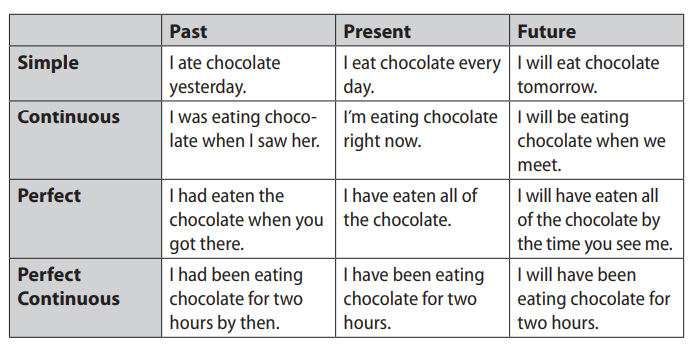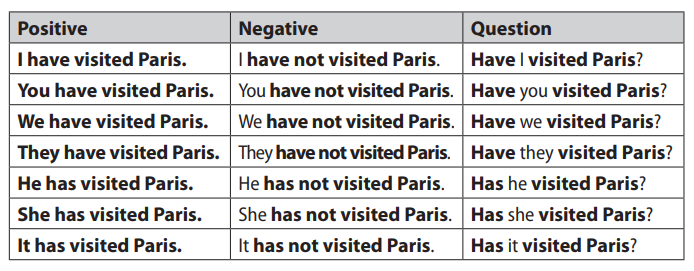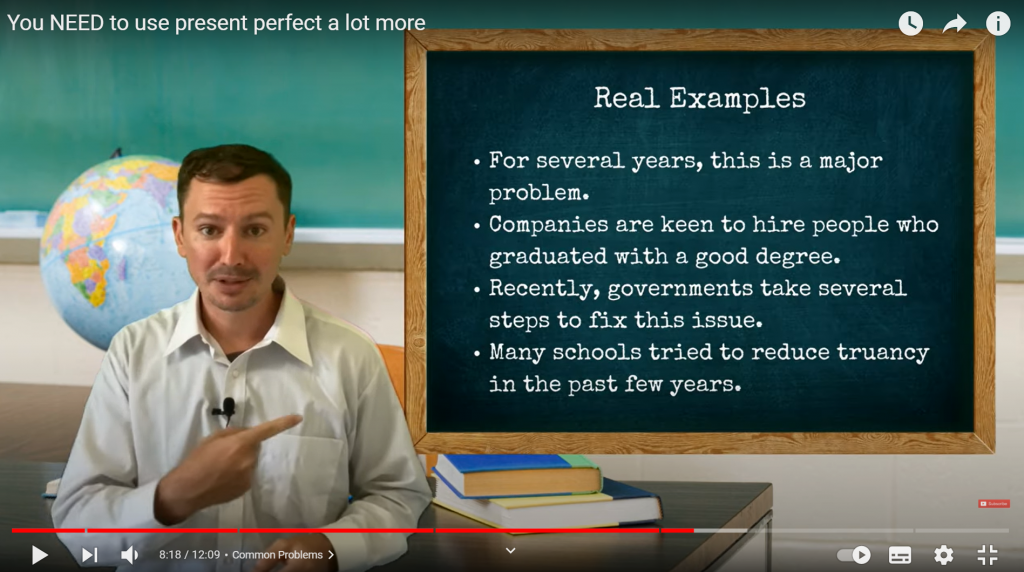In this article, we’re going to look at the present perfect tense, which is really underused by IELTS candidates. To do this, we’ll explore why verb tense is important, what the present perfect actually is, how we normally use it in IELTS, and then look at some common problems.
This is explained in video form here:
Why does verb tense matter?
In the IELTS writing test, you will be assigned a grade that is the average of your scores for 4 sections: Task Achievement, Coherence and Cohesion, Lexical Re, and Grammatical Range and Accuracy. As you might imagine, that last one is what we’ll be focused on today.
When it comes to grammar, there is a lot to think about but one of the first and most important aspects is verb tense. This can be really confusing for English learners because we have twelve different tenses, as you can see here.

If you want to learn about each of these tenses, you can pick a copy of my book, Grammar for IELTS Writing, which shows you how and when to use each of them.
In short, the reason that verb tense is so important is that it can completely change the meaning of a clause or sentence. When we learn language, we usually think about vocabulary first, and this is great, but let’s say you learned the word “install” and you wanted to talk about installing software on a computer. Depending on the tense you use, the person listening to or reading your sentence could have a completely different impression. “I install software on computers” tells the person that this is probably your job because you often do it. “I installed software on computers” tells the person that you used to do this as a job, but that you no longer do this. “I will install software on computers” shows future intent, and “I have installed software on computers” is letting them know that this is an experience you had once or more in the past, and which may happen again in the future.
This last sentence is an example of the present perfect tense.
What is the present perfect tense?
The present perfect tense is made by using “have” or “has” and then the past participle form of the main verb. Like any other tense, it can be made into a positive or negative statement, or turned into a question. Just make sure that the subject matches with the first verb, have or has.

I’m not going to spend a lot of time explaining how to make the present perfect tense because if you are reading this article then you probably already know. It is, honestly, a pretty easy tense to make… The hard part comes when deciding when to use it.
With the present perfect tense, there are three main uses. First of all, we use the present perfect to describe a finished action or state that occurred at an indefinite time in the past. I could say, for example, “I have been to France.” This means that I went to France at some point in the past. The two important time factors, however, are that I do not say WHEN this trip occurred and it could theoretically happen again in the present or future. The same is true of these examples:
- She has eaten sushi.
- They have learned Chinese.
Next, we use the present perfect tense for describing something that has happened in the past and may happen again in the future because the time period is not yet finished. For example, “It has rained today.” This means it rained earlier in the day but because it is still the same day, it could possibly rain again. Unlike rule #1, here we often do have a stated time but the action happens during that time and could continue now or in the future. Here are two more examples:
- She has had four coffees this morning.
- They have been to the office twice this afternoon.
Finally, and similar to the previous rule, the present perfect tense can be used for events that started in the past and may or may not be continued into the future. This typically involves using “for” or “since” to give information about the time. For example, I could say “They’ve lived in Beijing for six years.” This began in the past, continues now, and could continue into the future.
- They’ve been a couple since 2012.
- I’ve worked in finance for almost a decade.
As you can see from all three rules, the present perfect basically is used for events that started in the past and could theoretically continue. It might seem easy, yet, as we shall see, it is often misused when it comes to IELTS…
The present perfect and IELTS
The present perfect tense is one of the most common tenses in English and it can be used in a wide range of circumstances. It is appropriate in both formal and informal English (as long as you know how to use contractions) and is very useful for indicating when something happened.
It is this specificity in terms of time that is why the present perfect is so important in IELTS writing and speaking. The tense is frequently mixed up with the past simple or present simple tenses, and yet these convey entirely different meanings. Let’s take an example. If I said, “The internet has changed the way people communicate around the world,” it tells my reader something very clear and obvious – starting at a point in the past, the internet began to change communication and it continues to do so today, in the present moment. If I said, “the internet changed the way people communicate around the world,” it implies that this happened in the past and no longer continues to change our communication. If I said, “the internet changes the way people communicate around the world,” it suggests a series of repeated events. The first two examples are quite reasonable, though I think most people can agree that the internet continues to evolve and we adapt with it. The third is a bit strange because it implies this repetition of singular moments of change, but it is theoretically possible.
The big problem arises, though, when we want to give more information, and that is advisable for IELTS. We typically like to give some more detail and so we would want to say something like “Since the mid-1990s, the internet has changed the way people communicate around the world.” This is a perfectly good sentence, but alas maybe people do not understand the correct use of the present perfect tense and so they take that first part (“Since the mid-1990s”) and connect it to a different tense. This would be entirely wrong.
As you can see, then, the present perfect tense is common, versatile, and important for giving precise information about actions and when they occurred. It is especially useful for issues of change over time and, as you can imagine, that is really important in the IELTS writing test. Think about the common topics they give you – technology, healthcare, society, culture, crime, education, and so on. These are things that have changed a lot in recent years and thus it is very likely that you would need to use the present perfect to adequately discuss them. Unfortunately, this is not done nearly enough.
Common problems
As I explained in the previous chapter, the present perfect is an important tense but IELTS candidates just do not use it enough. That is the first and most serious problem. In fact, in my IELTS writing correction service, more than 90% of times that I mentioned the present perfect in my feedback, it is to say that it SHOULD HAVE BEEN USED.

Here are some examples. In each case, the candidate clearly referred to something that began in the past and continues or could continue in the present moment. However, they have not used the present perfect tense and so the sentence is grammatically incorrect. This tells the examiner that they do not know how and when to use this essential verb tense, and so the chances of them scoring higher than band 6 for Grammatical Range and Accuracy are very slim.
When you begin a sentence with an introductory or transitional clause that talks about time, if you use the words “for” or “since,” then you probably should use the present perfect tense. You need to make it a habit to look at the times mentioned or implied in your writing and choose the most appropriate verb tense.
Another mistake is mixing up the present perfect and past perfect tenses. This happens because, although their meanings are very different, their structure is quite similar. Take the sentences, “He has drunk four cups of coffee” and “He had drunk four cups of coffee,” for example. The first one means that the time period is ongoing and the second that it started and ended in the past. They have completely different meanings, but there is only one letter that’s different.
Aside from that, though, there aren’t too many mistakes in forming the present perfect tense as it is rather easy. Still, IELTS candidates sometimes get confused and use the correct form of “have” or “has,” then change the main verb from the past participle into something else. This can be very confusing for the reader as it no longer even resembles the present perfect and it can be hard for them to guess your meaning.
Finally, it is quite rare, but people sometimes use the present perfect instead of another verb. I only really see this error in task 1 reports because the time periods can be confusing and sometimes lead people to make silly errors. For example, they might say, “In 1985, interest rates have risen six percent.” This is wrong because of course 1985 was in the past and any changes to interest rates started and finished in that year.
In fact, the present perfect, whilst extremely common in English, is somewhat uncommon in task 1 because rarely does the data refer to the present moment. However, it can do. I actually covered this in a recent video all about the most difficult IELTS line graph. You can find that here:
Conclusion
Let’s review our lesson for today. The most important thing I want you to take away from this video is the fact that the present perfect tense is both common and useful. Sadly, many learners completely overlook it and this leads them to make big mistakes. For both IELTS writing and speaking, it can help you give accurate and grammatically correct answers, showing the examiner that you have the skill and knowledge required for a high band score.
Fortunately, it is not hard to learn how to use this tense. It can be formed very easily and we only have three rules for using it, which honestly could also be boiled down to one overall rule: if something started in the past and continues (or could continue) in the present, then we are probably going to use present perfect.